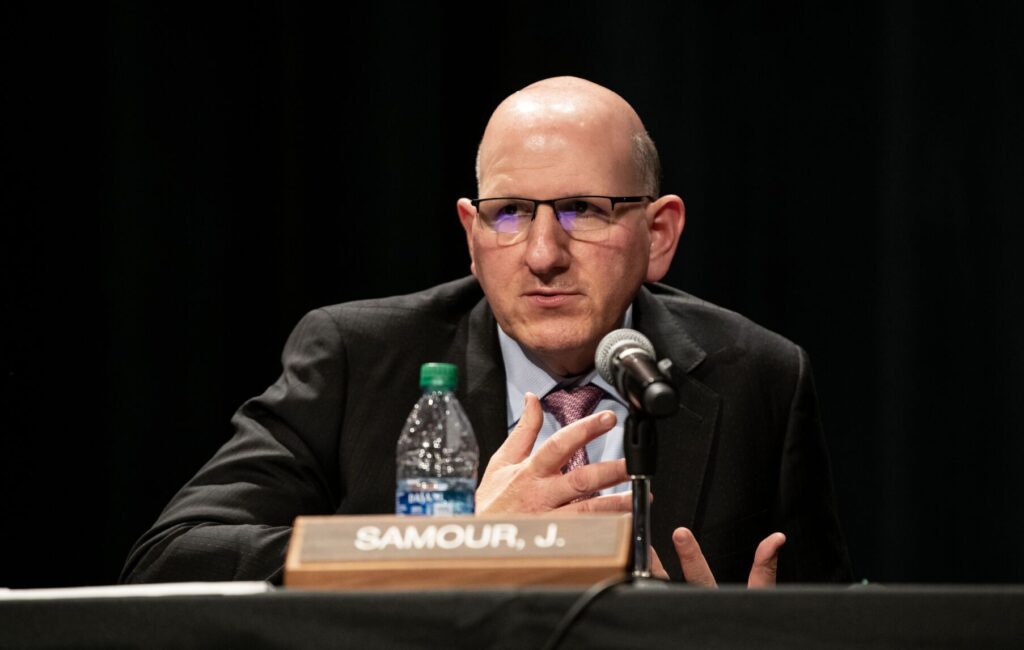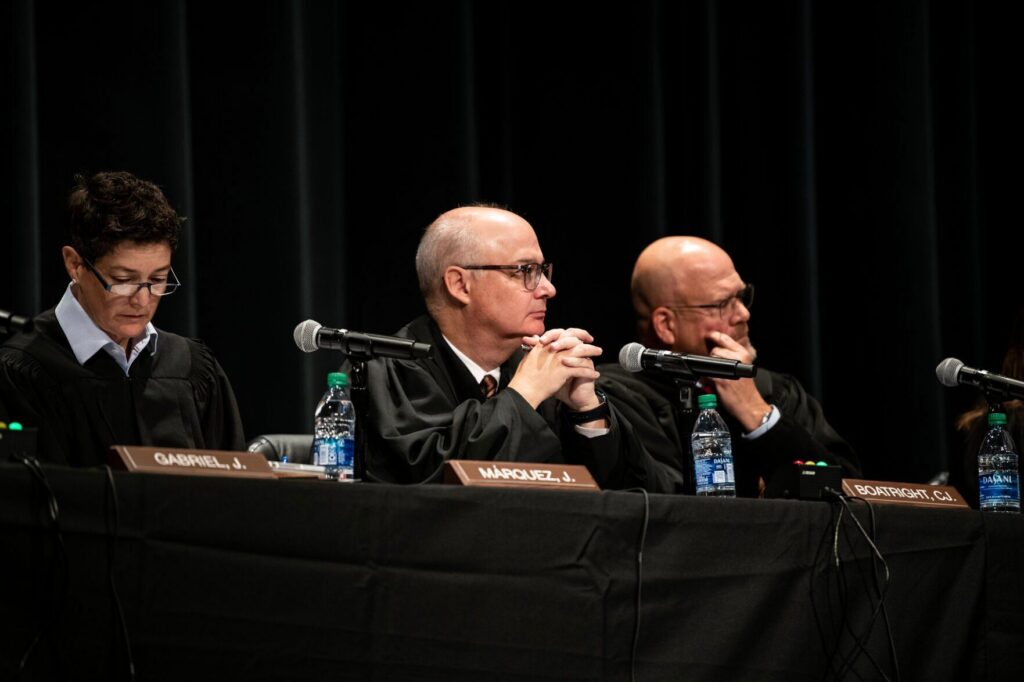Federal judge weighs legality of agency actions in ongoing expansion of Denver Water reservoir
A federal judge on Friday had numerous questions for the government and Denver Water about the ongoing construction of a key infrastructure project in Boulder County, as multiple advocacy groups seek to overturn the underlying permit based on alleged violations of federal law.
Six environmental groups are requesting that U.S. District Court Senior Judge Christine M. Arguello vacate the decisions by the U.S. Army Corps of Engineers and the U.S. Fish and Wildlife Service to authorize a major expansion of Gross Reservoir and Dam, located six miles southwest of Boulder. The long-planned project would allow Denver Water to store more water for the 1.5 million people it serves, equating to 25% of the state’s population.
In the plaintiffs’ telling, there were numerous flaws with the decision-making, encompassing conflicts of interest and questionable endangered species determinations. However, they primarily argued the alternatives to reservoir expansion were artificially limited due to a desire not simply to simply increase the amount of water, but to funnel it into one of Denver Water’s two separate delivery systems.
“We don’t dispute that Denver Water genuinely believes it needs additional water and they might, separately, need to do something to rebalance their system,” attorney William S. Eubanks II told Arguello. “But if you try to resolve them both in one fell swoop with one permit, you’re necessarily going to exclude alternatives that could achieve one objective or the other standing alone.”

An arial view of the Gross Reservoir and Dam construction in Boulder County as of Sept. 5, 2024. Photo courtesy of Denver Water
Denver Water and the federal government defended the two-decade process that led to the authorization of the reservoir expansion, while noting there is currently near-continuous pouring of concrete to raise the dam by 131 feet as planned. Pausing that operation “could compromise the structural integrity of the underlying dam,” said attorney Elizabeth Boucher Dawson.
For her part, Arguello interjected questions about technical aspects of the water delivery and regulatory process. But she also pressed the government on the plaintiffs’ key concern: the Gross Reservoir and Dam enlargement was a one-size-fits-all solution to the dual issues of water supply and system imbalance.
“What I didn’t see is an explanation of why both of those had to be solved at the same time,” she said. “By doing so, isn’t it true that alternatives that could have been considered for one of those reasons were excluded because they were combined?”
The expansion project, if completed, will enable Denver Water to capture 18,000 more acre-feet of water per year — with a single acre-foot amounting to 325,851 gallons. To Denver Water, the additional storage will make its delivery system more resilient in the face of drought.
Specifically, Gross Reservoir and Dam is linked to Denver Water’s North System, which is separate from and supplies less water than the South System. Because there is no linkage, Denver Water argued in court documents that in a single dry year, “the North System risks running out of water.”

A diagram depicting Denver Water’s two delivery systems and three treatment plants. Source: Save the Colorado et al. v. Spellmon et al.
Under the Clean Water Act, Denver Water needed a permit from the Corps to discharge fill material into wetlands during construction. The Corps evaluated 300 concepts, narrowed the alternatives to 34 and finally arrived at six proposals that involved reservoir expansion. The Corps issued its decision in 2017 and concluded the enlargement project was the “environmentally preferable alternative.”
Several groups then filed suit to halt the project: Save the Colorado, The Environmental Group, WildEarth Guardians, Living Rivers, Waterkeeper Alliance and the Sierra Club. While the litigation was pending, the Federal Energy Regulatory Commission approved an amended hydropower license for the dam.
Believing the environmental groups’ challenge was “inextricably linked” to the commission’s decision, Arguello ruled in 2021 that she did not have jurisdiction over the case, as commission-related challenges must be filed in federal circuit courts. The U.S. Court of Appeals for the 10th Circuit concluded that she was mistaken and it reinstated the lawsuit.

U.S. District Court Judge Christine M. Arguello
In advance of the Sept. 20 hearing, Denver Water argued the plaintiffs’ claims were moot because the Corps-authorized activity was now complete and construction was underway. The plaintiffs disagreed, noting that even if Arguello vacated the federal authorization and ordered further consideration, the result could be additional environmental mitigation measures or restrictions on the reservoir’s use.
Arguello focused on the Corps’ interpretation of federal regulations and the role of climate change in its analysis.
“This was not the rubber stamp that petitioners would have you believe,” responded Dawson, the lawyer for Denver Water. “So many people at Denver Water, the agencies and in the public played a role in the development of this project.”
Eubanks, representing the environmental groups, argued the use of “extremely outdated datasets” to forecast Denver Water’s demand rendered the approval arbitrary. He said there were 19 alternatives that would have given Denver Water the 18,000 acre-feet of water it desired.
But those options were eliminated because “they just didn’t meet this other, fabricated need,” meaning the flow balance between the North and South systems.
Arguello ordered the parties to provide additional information in writing by Wednesday before she issues a decision. The litigants suggested Arguello should give them the opportunity to argue what the remedy should be if she vacates the underlying authorization.
The case is Save the Colorado et al. v. Spellmon et al.











